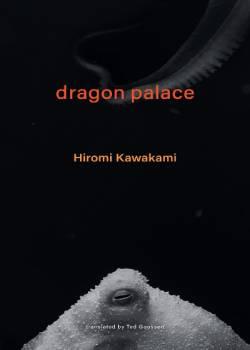Dragon Palace

By Kawakami Hiromi
Translated by Ted Goossen
Stone Bridge Press (2023)
ISBN-13: 978-1737625353
Review by Cameron Bassindale
At the outset, I must confess to being a philistine when it came to Kawakami Hiromi, before I read Dragon Palace. As an author she wasn’t totally alien to me; I had read one of her works, Strange Weather in Tokyo. In that novel, Kawakami charts an unlikely romance between a former student and teacher in the bustling metropolis. It is one of several of Kawakami’s works to be translated into English, being published almost exactly 10 years ago. I found it well-written, charming, light but it didn’t quite satisfy my thirst. Thirst for what, exactly, I can’t say. Being accustomed to the darker and more cerebral aspects of Japanese fiction, I enjoyed reading Kawakami’s smash-hit bestseller but had little desire to read her other works.
So then, when presented the opportunity to review Dragon Palace, I immediately began to imagine what kind of book it would be; tender and full of personal connection, love and loss. Well, I am pleased to report my expectations were thoroughly subverted. Dragon Palace is a collection of eight short stories, set in wildly different times and settings, which upon first reading have no discernible thread running through them save seemingly for the authors desire to unsettle and unnerve. As with any collection of short stories there are natural peaks and troughs, hits and misses, but overall Dragon Palace moves swiftly through one satisfyingly strange story to the next.
The first story starts on a timeless beach, our nameless narrator explaining in agonising detail the minutiae of his depressing life. His sorry situation is taken as a matter of course; without exception, the narrators in Dragon Palace have at the very least a core of loneliness and misunderstanding of the world they’ve been placed in. Then, this character meets a shape-shifting octopus. If reading that felt abrupt, then you will have some idea of how Kawakami melds the mundane and banal with the surreal and fantastic, to good effect.
This primes the reader for the second story, "Dragon Palace", the most challenging of the volume. The translator, Ted Goossen, deserves a lot of credit for this story in particular. Phrases like “Oto-sama. We implore you. Please quell your anger” really capture the sense of Japanese folklore that Kawakami was aiming for. Without giving too much away, this particular tale concerns the sex-crazed ghost of the narrator’s ancestor regaling her with bemusing and deeply depressing tales. While this may seem absurd, this is one of the most naturalistic stories in the book, in the sense that it doesn’t feature form-shifting animals, as most of the other stories do.
More prudish readers may find Kawakami’s preoccupation with sex in all its forms a little off-putting, and truthfully this novel is not for them. Coupled with Kawakami’s insistence on inserting animals into human skin, some stories are really not for the faint of heart. The following story, reminiscent of Strange Weather in Tokyo, explores ideas of sex, attraction and love between an elderly man-turned-fox and a much younger woman. As the story goes on, the sexual overtures only become more explicit and off-putting to some.
This too may not be the book for readers looking for neat, satisfying conclusions. Most of the narratives throughout Dragon Palace start and end quite abruptly, with a melange of fantastically strange scenarios in between. The more cynical reader with expectations of a more traditional narrative structure may feel a little short-changed with this book; Kawakami opts instead for narrow slices-of-life which admittedly is not for everyone. Those looking for a collection of short stories with a (semi) coherent narrative and a quintessential Japanese-ness might instead prefer Revenge by Kawakami’s fellow female literary behemoth, Ogawa Yoko.
While this review has spent a fair deal of time describing those who this book isn’t for, that is in no way to say that Dragon Palace isn’t worthy of your time. Quite the opposite, this translation will be of interest to anyone with a desire to read something exceedingly unique. Dragon Palace is a challenging, dark, unsettling read; this has been well established. But it is also surprisingly deep and introspective. What on the first reading may seem contrived to shock the reader will on the second reading touch on essential human questions: “what is it to desire something”, “what is it to be human?”
The final stories, ‘Shimazaki’ and ‘Sea Horse’, are a most satisfying pay-off for slogging through some of the earlier stories. Kawakami comes into her stride by the end of the collection, and finally strikes a balance which will resonate with the thoughtful reader. If you can dig through the rough patches of Dragon Palace, you will surely find what you are looking for within it.

